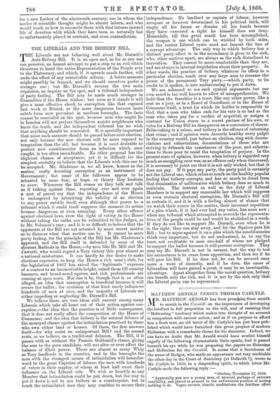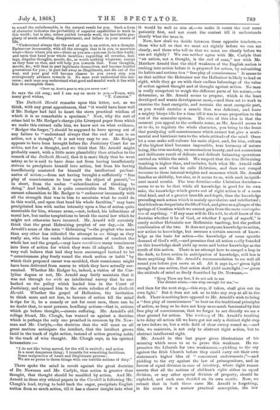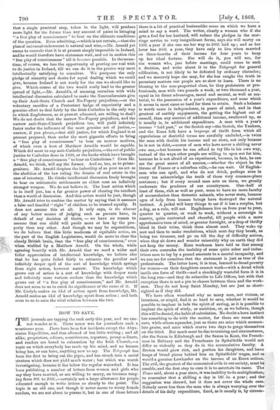MATTHEW ARNOLD VERSUS THOMAS CARLYLE.
\IR. MATTHEW ARNOLD has been preaching from month I , to month in the Cornhill on the importance of developing the intellect in full proportion to the will, and of resisting that " Hebraizing " tendency which makes true thought of no account in comparison with earnest action ; and as if on purpose to afford him a fresh text, an old letter of Mr. Carlyle's has just been pub- lished which would have furnished this great prophet of modern Hellenism with a remarkable theme for his discourse. Indeed, we can have no doubt that Mr. Arnold would have availed himself eagerly of the following characteristic little epistle, had it passed beneath his eye while he was preparing the papers on Hebraism and Hellenism for the Cornh ill. It seems that a Scotchman of the name of Rodger, who made an appearance not very creditable the other day in the Court of Justiciary (at Dalkeith ?), wrote to Mr. Carlyle in 1850, in a desponding spirit, to which letter Mr. Carlyle made the following reply :— "Chelsea, November 17, 1830. "Apparently you are a young man, of unusual, perhaps of extreme sensibility, and placed at present in the unfortunate position of having nothing to do. Vague reverie, chaotic meditations, the fruitless effort to sound the unfathomable, is the natural result for you. Such a form of character indicates the probability of superior capabilities to work in this world ; but is also, unless guided towards work, the inevitable pro- phecy of much suffering, disappointment, and failure in your course of life.
"Understand always that the end of man is an action, not a thought. Endeavour incessantly, with all the strength that is in you, to ascertain what—there where you are—there as you are—you can do in this world ; and upon that bend your whole faculties ; regarding all reveries, feel- ings, singular thoughts, moods, dm., as worth nothing whatever, except as they bear on that, and will help you towards that. Your thoughts, moods, dic., will thus in part legitimate themselves, and become fruitful possessions for you ; in part fall away as illegitimate, and die out of the way, and your goal will become clearer to you every step you courageously advance towards it. No man ever understood this uni- verse; each man may understand what good and manful work it lies with him to accomplish there.
'Cheer up, there's gear to win you never saw So says the old song; and I can say no more to you.—Yours, with
many good wishes, "T. °Alum."
The Dalkeith Herald remarks upon this letter, not, as we think, with any great appositeness, that "it would have been well if Mr. Rodger had laid to heart the stern practical wisdom of which it is so remarkable a specimen." Now, why the sort of crime laid to Mr. Rodger's charge (the Liverpool paper from which we make this extract calls him, we know not on what evidence, "Badger the forger,") should be supposed to have sprung out of any failure to "understand always that the end of man is an action, not a thought," it is not very easy to see. Mr. Rodger appears to have been brought before the Justiciary Court for an action, not for a thought, and we think that Mr. Arnold might probably assert, with a little more plausibility than attaches to the remark of the Dalkeith Herald, that it is more likely that he went astray as he is said to have done not from having insufficiently striven to precipitate himself into action, but from his having insufficiently mastered for himself the intellectual prelimi- naries of action ;—from not having brought a sufficiently "free play of consciousness to bear upon the object of pursuit,"— in short, from the undue "subordination of thinking to doing." And indeed, it is quite conceivable that Mr. Carlyle's earnest admonition to Mr. Rodger to "endeavour incessantly with all the strength that was in him to ascertain what he could do in this world, and upon that bend his whole faculties," may have precipitated him with undue intensity upon a line of action quite unsuitable for him, whence arose,—not, indeed, his infractions of moral law, but undue temptations to break the moral law which he might not otherwise have incurred. Mr. Arnold will certainly think that the great Hebraizing prophet of our day,—in Ur. Arnold's sense of the term " Hebraizing "—the prophet who more than any other has ridiculed the attempt to see things as they really are, who has made laborious earnestness of conduct the whole law and the gospel,—may have overdriven many consciences into lines of action for which they were ill adapted. He may very well believe that had they been encouraged instead to let "consciousness play freely round the stock notion or habit" by which their proposed career was moulded, their consciences might have been delivered from snares to which they have actually suc- cumbed. Whether Mr. Rodger be, indeed, a victim of the Car- lylian dogma or not, Mr. Arnold may fairly maintain that it was not through too wide an intellectual survey that he em- barked on the policy which landed him in the Court of Justiciary, and exposed him to the stern rebukes of the Dalkeith Herald. Whether the gospel of Hellenism, the invitation to think more and act less, to beware of action till the mind is ripe for it, be a remedy or not for most men, there can be no doubt that, to most persons, headlong actions—that is, actions which go before thought,—ensure suffering. Mr. Arnold's old college friend, Mr. Clough, has warned us against a doctrine which is perhaps the only one preached in common by Dr. New- man and Mr. Carlyle,—the doctrine that the will must on all great matters anticipate the intellect, that the intellect grows lucid in the track of right action, instead of action growing noble in the track of wise thought. Mr. Clough says, in his spirited hexameters :- "I do not like being moved, for the will is excited ; and action Is a most dangerous thing ; I tremble for something factitious, Some malpractice of heart and illegitimate process ; We are so prone to these things with our terrible notions of duty."
There spoke the mind in revolt against the great doctrine of Dr. Newman and Mr. Carlyle, that action is greater than thought, that thought should be moulded by action. And Mr. Arnold in these airy ethical papers in the Cornhill is following Mr. Clough's lead, trying to hold back the eager, precipitate English nation from so much action, till it has a clearer insight into what
it would be well to aim at,—to make it count the cost more patiently first, and not court the contest till it understands clearly what the issue is.
Now, how shall we decide between these opposite teachers,— those who tell us that we must act rightly before we can see clearly, and those who tell us that we must see clearly before we can act rightly ? We can neither agree with Mr. Carlyle that "an action, not a thought, is the end of man," nor with Mr. Matthew Arnold that the chief weakness of the English nation is rushing into action before it is prepared for action, by submitting its habits and notions to a "free play of consciousness." It seems to us that neither the Hebraizer nor the Hellenizer is likely to lead us right, while they go on with their endless balancings of the value of action against thought and of thought against action. No man is really competent to weigh the different parts of his nature,—to determine, as Mr. Arnold seems to propose, which is the least developed and wants development most,—and then set to work to exercise the least energetic, and restrain the most energetic part, as you would exercise a muscle that was deficient, and leave a mighty biceps idle for a time till it was in some proportion to the rest of the muscular system. The vice of this idea is that the moment you appeal to the msthetic sense, as Mr. Arnold seems to us to do, to regulate the whole character, you bring to the front that paralyzing self-consciousness which cannot but give a senti- mental and histrionic turn to the whole attitude of the mind. Once let a man make self-culture his main object, and, for him, culture of the highest kind becomes impossible, true harmony of nature being, like true modesty, an unconscious beauty, and not a conscious and deliberate result of delicate and difficult balancing operations carried on within the mind. We suspect that the true Hebraizing teaching is higher than, and includes, both what Mr. Arnold calls Hellenism and what he calls liebraism, and does not compel recourse to these internal weights and measures which Mr. Arnold handles so skilfully, but also, as it seems to us, with such insignifi- cant moral results. The true doctrine—the Christian doctrine— seems to us to be that while all knowledge is good for its own sake, the knowledge which grows out of right action is of a more vital kind, and of a greater breadth and depth, than the knowledge preceding such action which is mainly speculative and intellectual ; that it leads us deeper into the lifeof God, and gives us a glimpse of the springs of Creation which we cannot gain from the mere contempla- tion of anything. "If any man will do His will, he shall know of the doctrine whether it be of God, or whether I speak of myself," is surely neither Hebraistic nor Hellenistic teaching, but the perfect combination of the two. It does not postpone knowledge to action, nor action to knowledge, but assumes a certain amount of know- ledge as the basis for action—the knowledge of some specific demand of God's will,—and promises that all action really founded on this knowledge shall yield up more and better knowledge as the result of this action. There is no attempt here to compel a leap in the dark, to force action in anticipation of knowledge, still less is there anything like Mr. Arnold's recommendation to see well all round you before you move at all. All it says is,—' given light
enough for one action, that action shall yield more light given the attitude of mind so finely described by Dr. Newman,—
" Keep Thou my feet, I do not ask to see The distant scene,—ono step enough for me,"— and then for the next step,—this step, if taken, shall give out its own light.' But it does not ask us to take any step at all in the dark. There is nothing here opposed to Mr. Arnold's wish to bring a "free play of consciousness" to bear on the traditional principles of action, so long as he does not keep us so much fascinated by this free play of consciousness, that we forget to act directly we see a clear ground for action. The tendency of Mr. Arnold's teaching is to delay all action till we have got not only a distinct right stop or two before us, but a wide field of clear survey round us,—and this, we maintain, is not only to obstruct right action, but to obstruct intellectual sight.
Mr. Arnold in this last paper gives illustrations of his meaning which seem to us to prove this weakness. He re- proaches the Liberals for two weaknesses,—yielding to the cry against the Irish Church before they could carry out their own statesmen's higher idea of " concurrent endowments ;"—and yielding to the cry against the law of primogeniture, and in favour of equal division in case of intestacy, where right reason asserts that all the notions of children's rights either to equal division, or any other special division of property, should be exploded, and each case decided on its own merits. Now, we submit that in both these cases Mr. Arnold is forgetting, in his scorn for a narrow practical conception, the law that a single practical step, taken in the light, will produce more light for the future than any amount of pains in bringing "a free play of consciousness" to bear on the ultimate conditions of the question. Even admitting,—which is not certain,—that the planof universal endowment is natural and wise,--Mr. Arnold yet seems to concede that it is at present simply impossible in Ireland, and he would therefore have statesmen wait, and set in motion this "free play of consciousness" till it becomes possible. In the mean- time, of course, we lose the opportunity of proving our real wish to do justice in Ireland, till we can do it in the precise way most intellectually satisfying to ourselves. We postpone the only pledge of sincerity and desire for equal dealing which we could give, because Ireland is not ready for the one we should like to give. Which course of the two would really lead to the greater spread of light,—Mr. Arnold's, of amusing ourselves with wide intellectual discussion calculated to make the Nonconformists give up their Anti-State Church and No-Popery prejudices,—or the voluntary sacrifice of a Protestant badge of superiority and a genuine effort to deal fairly by the Irish Catholics in the only way in which Englishmen, as at present educated, are willing to deal? We do not doubt that the narrow No-Popery prejudices, and the narrow anti-State-Church prejudices too, will yield infinitely faster under the influence of the most genuine act of justice,— narrow, if you please,—but still justice, for which England is at present prepared, than under the most gigantic efforts to bring a "free play of consciousness" to bear on narrow motives, of which even a host of Matthew Arnolds would be capable. Which did most to sap anti-Catholic prejudices,—the act of public justice to Catholics done in 1829, or the books which have brought a "free play of consciousness" to bear on Catholicism ? Even Mr. Arnold, we think, will say the former. And so, too, as to primo- geniture. Mr. Arnold despises the imbecility of so poor an act as the abolition of the law ruling the demise of real estate in the case of intestacy. He thinks intellectual discussion freely brought to bear on aristocratic settlements on eldest sons an infinitely stronger weapon. We do not believe it. The least action which is in itself just, has a far greater power of clearing the intellect than a world of discussion. And this action would be just, though Mr. Arnold tries to confuse the matter by saying that it assumes a false and fanciful " right " of children to be treated equally. It does not assume this at all. It only says, in the absence of any better means of judging such as parents have, in default of any decision of theirs, — we have no reason to assume that one child will profit more or less by the pro- perty than any other. And though we may be superstitious, we do believe that this little modicum of equitable action, on the part of the English Legislature, would do more to clear the cloudy British brain, than the "free play of consciousness," even when wielded by a Matthew Arnold. On the whole, while agreeing heartily with Mr. Arnold that we need a wider and fuller appreciation of intellectual knowledge, we believe also that he has quite failed fairly to estimate the peculiar and infinitely deeper spell of the sort of knowledge which springs from right action, however narrow. The knowledge which grows out of action is a sort of knowledge with deeper roots and infinitely more various suckers than the knowledge which grows out of "a free play of consciousness," and Mr. Arnold does not seem to us to catch its significance or the cause of it. If Mr. Carlyle makes an idol of action apart from knowledge, Mr. Arnold makes an idol of knowledge apart from action ; and both seem to us to miss the vital relation between the two.
































 Previous page
Previous page